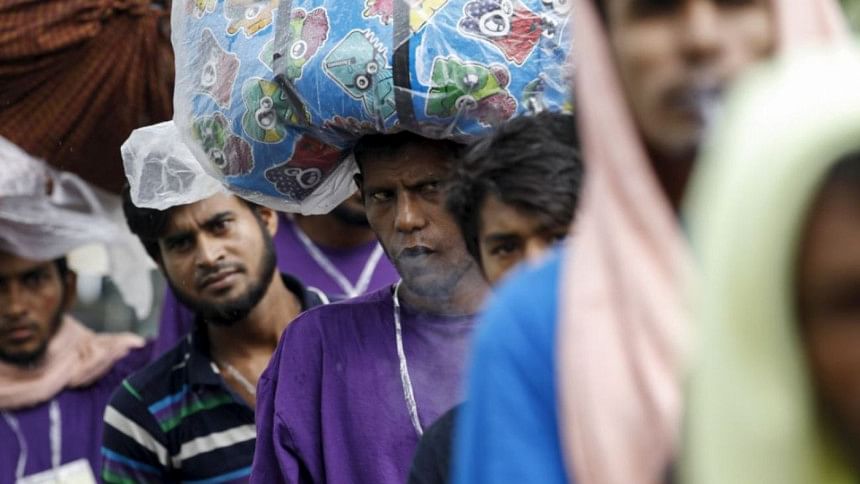The Pledge of December 18, 2015

In December 2000, the UN General Assembly declared December 18 as the International Migrant Workers' Day. The civil society in Bangladesh has been commemorating this day since 1997 and the government began to participate in the celebrations from 2009. This year, the day is being observed at local, district and national levels by various government and civil society organisations.
While observing this year's International Migrants Day, we must remember those migrants who perished in the Bay of Bengal while pursuing their dreams to migrate to Malaysia through maritime routes. We shed tears for those who rest in mass graves of Thailand and Malaysia, express our deep condolence to those families who have lost their bread earners and console the mothers who cannot answer their children when they ask about their traceless or deceased fathers.
This is the day to extend the commitment of the government to the welfare of these families.
In the recent past, the day provided an opportunity to the government to highlight its achievements in managing labour migration. After successive years of low or negative growth in sending workers and receiving remittance and loss in traditional markets, this year the government has accomplishments to share. Since mid-2015, there has been a major growth in the number of migrants going overseas compared to last year. Up to October 2015, the flow has grown by 7 percent. After a long hiatus, a sizeable number of workers have migrated to Kuwait and Malaysia. These were major breakthroughs in securing back traditional labour markets. We have also seen an upward trend in remittance flow.
In September this year, the UN General Assembly adopted the SDGs that are to be achieved by 2030. As migration did not feature in the goals or indicators of the MDGs, it could not be pursued as a tool for development. Bangladesh played a leading role in advocating that migration receives its due place in the goals and indicators of the SDGs. In collaboration with the Swiss government, Bangladesh hosted a major international event where governments and experts from 80 countries and concerned UN and other international agencies participated. Along with initiatives of others, its efforts resulted in the inclusion of migration in at least four of the 18 goals of the SDGs and many of their indicators. This has major ramifications for future development programmes to be pursued in various countries, including Bangladesh, by bilateral and multilateral development partners.
Bangladesh will host the 2016 UN Global Forum on Migration and Development. Government representatives of more than 150 countries, both origin and destination, will discuss migration and development issues in that meeting. Civil society organisations will either take part or run parallel sessions. Among other items, Bangladesh has proposed a social cost of migration, and the state of children and families left behind as issues of discussion. All these steps are praiseworthy.
The draft of the Seventh Five Year Plan has been made available on the internet. The document has identified migration as one of the tools for development. This is indicative of the fact that labour migration is gradually carving its niche in mainstream development planning.
However, the parents who lost their sons, women who lost their husbands and children who lost their fathers in their fateful voyage to Malaysia through maritime routes, would like to see more. They demand punishment of the perpetrators who lured unsuspecting, aspiring poor migrants. Instead of holding the less literate migrants responsible for tarnishing the image of the country, the government may concentrate on decisively acting against the politically powerful quarters, who are engaged in heinous human trafficking syndicates. Let this be the pledge of the government to the perished and traceless on this International Day of Migrants.
The writer is Professor of Political Science, University of Dhaka and Chair, Refugee and Migratory Movements Research Unit (RMMRU).

 For all latest news, follow The Daily Star's Google News channel.
For all latest news, follow The Daily Star's Google News channel. 



Comments